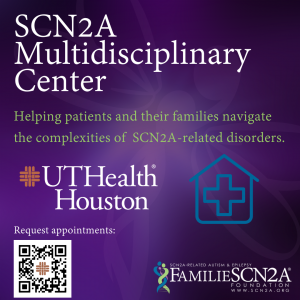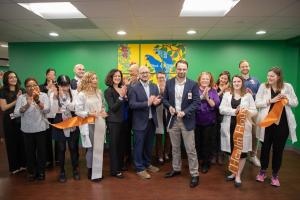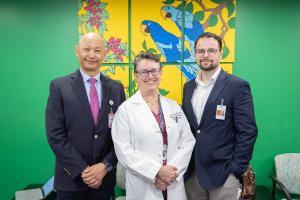
FamilieSCN2A Foundation Partners with UTHealth Houston on First Multidisciplinary Center for SCN2A-Related Disorders
Forging a Path Towards a Brighter Future
Leah Myers, Executive Director of the FamilieSCN2A Foundation, the largest global advocacy organization for the group of disorders, said the Foundation is excited to partner with UTHealth Houston to host the first SCN2A Multidisciplinary Center. “A recent survey of our community indicated a strong desire for a place where families could go to get SCN2A-focused care. It’s a relief for families who are navigating a very complex and fragile medical condition in our children to not have to be the experts in this rare disease. At UTHealth Houston’s SCN2A Multidisciplinary Center, we can rely on a team of specialists dedicated to our child’s well-being, who can help us stay ahead of potential comorbidities and keep us apprised of upcoming clinical trials. Multidisciplinary Centers are crucial for navigating the complexities of SCN2A-related disorders, ensuring comprehensive care, and fostering collaboration toward innovative treatments.”
Shawn M. Egan, PhD, Chief Scientific Officer of the FamilieSCN2A Foundation thinks this is a big milestone for SCN2A that will help propel the shift toward more proactive rather than reactive treatment of SCN2A-related disorders. “This is a major advancement for the SCN2A community. Having a center where families can quickly get up to speed on how to manage their child’s condition is something that our community has been asking for, as it has the potential to save lives and improve others—today. Additionally, the deep research focus at UTH Houston can be a major inflection point toward a more positive future for our children, deepening our understanding of SCN2A-related disorders and accelerating novel drug development.”
The UTHealth Houston team is being led by Dennis Lal, PhD, Gretchen Von Allmen, MD, and Samden Lhatoo, MD.
Dennis Lal, PhD, Associate Professor and Director of the Center for Neurogenetics Department of Neurology at UTHealth Houston who has published more than 150 research papers on genetic epilepsies and many on SCN2A-related disorders specifically, will lead the genetic counseling program. This specialized program not only informs families and patients about their specific SCN2A prognosis but also incorporates mutation-specific information to improve the care decisions made by treating neurologists.
“For a long time, the full spectrum of this condition was unclear because symptoms can look different depending on the version of the defect in the gene,” said Lal, who has served as a scientific adviser for the FamilieSCN2A Foundation, among other rare genetic epilepsy foundations, for years. “But today, because of our experience treating these disorders, we can have patients reevaluated from a genetic perspective in order to optimize their needs. By determining which version of the disease patients have, we can select the appropriate therapies to reduce seizures and design customized referral strategies.”
Gretchen Von Allmen, MD, Professor, Director of the Division of Child and Adolescent Neurology, and Director of the pediatric epilepsy program in the Department of Pediatrics, will lead the center for pediatric epilepsy patients, while Samden Lhatoo, MD, Professor and the John P. and Kathrine G. McGovern Distinguished Chair in the department, will lead the center for adult epilepsy patients.
“Like many other causes of epilepsy and developmental problems in children, there are a number of body systems that are affected by SCN2A-related disorders in addition to the brain, including the respiratory system, bones and muscle, vision, the gastrointestinal system, and others,” said Von Allmen, who is also the Jacobo Geissler Distinguished Chair in West Syndrome Research with the Department of Pediatrics. “At this center, we have genetic experts, epilepsy experts, and pediatric subspecialists who can all work together to take care of the whole patient. It really cuts down on the journey that these families go on to find experts in their child’s disease.”
Studying the condition in adults will also be critical, Lhatoo said. “This is an important condition that we hope will soon be treatable with the advent of gene therapies, but unfortunately, it’s also a neglected area of study, and little to nothing is known about the disease trajectory, especially in adults,” Lhatoo said. “The multidisciplinary center goes a long way in addressing this gap in knowledge and therapeutics.”
Thanks to the Foundation’s efforts to promote International SCN2A Awareness Day, Gov. Greg Abbott has proclaimed Feb. 24 as SCN2A Awareness Day in Texas. The date is significant because the SCN2A gene is located on the long arm of chromosome 2 at position 24.3.
Leah Myers
FamilieSCN2A Foundation
+1 301-252-8070
email us here
Visit us on social media:
Facebook
Twitter
LinkedIn
Instagram
YouTube
TikTok
See the difference 'families' make.
EIN Presswire does not exercise editorial control over third-party content provided, uploaded, published, or distributed by users of EIN Presswire. We are a distributor, not a publisher, of 3rd party content. Such content may contain the views, opinions, statements, offers, and other material of the respective users, suppliers, participants, or authors.




